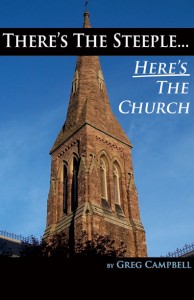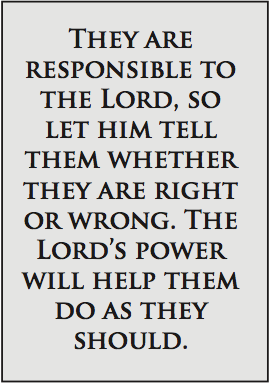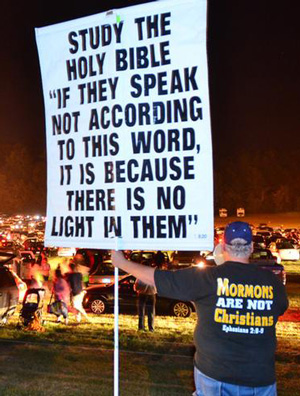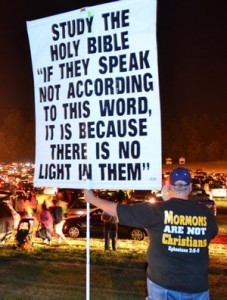 Fridays in August will be featuring a selected chapter from the book I published on the topic of the Church, titled, There’s The Steeple… Here’s The Church—I call it “The Church Book”. If you’d like to read the rest, click the book cover to the left to purchase your copy from Amazon.com! (And, thank you!) Or, see the footer of this post for how to obtain a FREE copy.
Fridays in August will be featuring a selected chapter from the book I published on the topic of the Church, titled, There’s The Steeple… Here’s The Church—I call it “The Church Book”. If you’d like to read the rest, click the book cover to the left to purchase your copy from Amazon.com! (And, thank you!) Or, see the footer of this post for how to obtain a FREE copy.
Today is the final chapter of this month of “Church Book Excerpts” from the book you see above. If you like what you’ve read, I’d love for you to have a copy of the book. Click through the links above (and also, more information in the article’s footer) to find out how to get your copy.
This chapter is a bit longer, but worth thinking through. Sometimes it’s good to take a look at your focus, and, as necessary, refocus your lens on what you’re truly hoping to capture.
Focus

e are off this weekend—not singing anywhere—and even have a break from the kids, while they are with Grandma. So, sometimes when a free weekend presents itself, we will enjoy the quietness and solitude of home when we would otherwise be “working” on a weekend, leading worship in various locations. Today, though we both really wanted to join our friends at Cross Creek Church in Palmyra. When we heard songs that they often do playing on our iPod, we thought of them. We thought of how long it has been since we have seen many of them, since outside of Cross Creek, our lives do not connect. We just had a longing to be there.
So, thanks to a last minute phone call with a friend this morning where we were reminded of the new meeting times, we made it! And it was great to see everyone! It had been a long time, but we got a sentence or two in with most of the folks we know. At least a handshake and a genuine, “Hello.” It was wonderful.
As I was preparing for that this morning, looking forward to seeing everyone, I remembered a brief conversation with a pastor friend of ours. We were talking about how I personally get the most out of any times where I get to connect with friends, other believers who are there for the morning meeting. We catch up on life, what God has been or is doing in their life. How the family is doing, what’s new… all of that sort of stuff. A real connection that seems hard in between the scheduled goings on, and is impossible as I sit quietly on my duff placing my attention on the happenings in the front of the room.
When I mentioned that was what meant the most to me, he quipped with a sarcastic smile, “Why don’t you just go join the moose lodge?!” He was not telling me I should leave, just revealing the focus that he places on our large group gatherings. They are the time we come to learn, to “worship”, and to focus on God—not each other. It’s a vital piece that we do it together, as the family of God, but it’s not the focus.
That is where I beg to differ. I think that “worship” is not a time or a place (as Jesus told the Samaritan woman in John 4) but something we do with every breath. (A popular song uses just those words, “With ev’ry breath I’m praising you…”) So my main reason for going to a large group gathering of believers then is not to worship, since that is something I do every day, all the time, anywhere.
But what about the teaching? Surely that is a reason to attend such a gathering? Absolutely! While I do not deny that so much can be learned from the great teachers who can present clear and understandable truths about the Kingdom from their study and their experience and walk with God, that still is not my main focus for attending such a meeting. Again, I submit that throughout the remainder of each week, my mind and heart are filled with great thinkers’ thoughts on the Kingdom be they in books, web pages, MP3s, radio programs… what have you. There is such a wealth of great teaching available to anyone and everyone today that the Sunday morning gathering is certainly not my primary source of such teaching. And, aside from all of the “expert” teaching we receive from the so-called “professionals”, I enjoy learning from my neighbors, the way they interact with my Father. I enjoy listening to God’s voice through the experiences of friends who may not think themselves teachers, but by sharing their lives with me take on that very role in my life.
So again, at least for me, the reason for attending such a meeting is not to worship—that happens all week long, all the time—nor is it to “be fed” as we like to call it. It is not for the teaching, as again, there is no shortage of that in my life.
Is it perhaps the specialness of the place? No. I mentioned that already, too. Jesus said that worship is not a located thing. There is no place we can go to be closer to him as he now resides in us. In us! We are the temple of the Holy Spirit! That is too deep to go into here. Perhaps another time.
So that leaves me with… the other believers! The reason that I want to attend such a meeting has nothing to do with anything that is planned. Though that is always nice—and helpful—I could get that anywhere. The reason for me is to connect with other believers—especially ones I would not otherwise connect with. To share some piece of our current journey together. To feel and see the bigness of God’s family. So much larger than me. So much larger than my small group of friends. He is real and central in so many lives other than my own. And I love to know Him through them.
Unfortunately, if this is the main reason for Christians gathering in large groups, you’d never know it. The focus certainly seems to be on the events planned for that day. Even today, I was told when to stand, when to sit, and what would be happening next. Nothing out of the ordinary. That’s what we do. But, if the greatest thing we have as we gather is each other, it does not seem like that element is being emphasized or facilitated in any way, does it? Do we make that a priority in our gatherings?
Some churches do this well. While maintaining a priority on the up-front events, they carve out a decent amount of time for people-connecting. Cross Creek is one such group. There is a time in the middle to get some coffee and just say hello to everyone. Theirs lasts perhaps 5-6 minutes. There has been a church or two along our path who has taken as much as 15 minutes for such an event. That’s great! But again, usually it is much less than 10% of the time we are together. Usually much less. Often there is a bit more time in the parking lot, or the lobby after the scheduled portion of the meeting is over, but too frequently, everyone has other things they need to get on to.
Please do not think I fault only those responsible for planning the church gatherings. I do not presume that they have so much influence over an entire culture. Certainly a good portion of the blame for a misplaced focus rests on those who “attend” these meetings. Arriving late (due to rousing and preparing a family of small children at such a time of the day, no doubt…) and getting everyone to their respective rooms, entering the main room just in time to sing the last song with everyone. Then sitting through the remaining portion of the show, taking notes and attempting to hear God’s truth for their personal life packed into about 45 minutes of one hour. As it’s over, the rush to pick up the kids ensues. After collecting them all, their tiredness, and crankiness overtakes your desire to connect with other believers, and you rush out the door to get home, or to do whatever else might be planned before you can go home.
Life these days is certainly a rush. That’s why we try and pack so much into a “worship service”. We “only have an hour a week to reach them”. That is the mentality in some circles. At least from the leadership position. Perhaps there is an equally sad mentality from the seats. “You only have one hour to reach me, God… so say something meaningful… and quick!”
So while we go expecting to give to God, and him to us, we miss the joy of community. We miss perhaps the greatest part of “the church”. Not the building, the time, the meeting, or the organization. The people whom God has called to himself. From out of the world, into His Kingdom. The Believers. The Saints. The Called Out Ones. His Church.
Acts 4:32
All the believers were of one heart and mind, and they felt that what they owned was not their own; they shared everything they had.
Everything was about the oneness. Everything was about the togetherness. They loved being together. They shared everything. All the time. Acts 2 says they even went to the temple everyday to worship (as was their custom). They ate together, prayed together, shared meals together… even shared money. Life was about being together. And why not? The rest of the world hated them. The persecution was on a level that we can not comprehend in 21st century America. We have not, and perhaps will not experience such hardship. So to join together was an oasis in the desert. It was the living water of Jesus—his very body—together as one. How could they come together but once a week and then only to sit and listen to a presentation, with minimal participation, organized and performed by a select few? Where was the sharing of everything there?
No. Their focus was not on the schedule of a planned meeting. It was on each other. On their joys, on their hardships. On their shared journey with an amazing Father. That is where I find joy—even in as little time as is allotted for such—that is where I find joy when gathering with other believers.
Perhaps that is just me being the way God made me? Or, perhaps our focus is slightly shifted. What if we re-focused? What if our gatherings were not as much about the individual and God, but more about his children encouraging and exhorting each other? Wouldn’t that be as much (or more?) worship than listening to a carefully and wonderfully crafted hour of events?
Well, at least that’s how it looks through my lens.

This post is a chapter in the book There’s The Steeple… Here’s The Church by Greg Campbell, available through Amazon.com. If you’d like to purchase the book, please click the book title in the previous sentence. If you’d like a free PDF version, it is available here. Also have some of the audio version available at church.gregshead.net. Thanks for reading, sharing, and feel free to add to the discussion in the comments below, or wherever else you can reach me.



 (Note: That is not to say there is no place for confrontation. If there is a person whom you love who is clearly doing something that will harm them, there is a place for direct and unpleasant confrontation. It most likely will not resolve the issue at that moment, but can certainly lead to better choices down the road. If, as in everything, it is done “in love”. Real love. Not just, “I say this in love” love.)
(Note: That is not to say there is no place for confrontation. If there is a person whom you love who is clearly doing something that will harm them, there is a place for direct and unpleasant confrontation. It most likely will not resolve the issue at that moment, but can certainly lead to better choices down the road. If, as in everything, it is done “in love”. Real love. Not just, “I say this in love” love.) Somehow, through the centuries and millennia of history, religious folk have gotten the notion that the supreme goal of their spiritual pursuit is to know the right answer—to find and know the Truth. With a capital ‘T’.
Somehow, through the centuries and millennia of history, religious folk have gotten the notion that the supreme goal of their spiritual pursuit is to know the right answer—to find and know the Truth. With a capital ‘T’.


 “You’re a human being, not a human doing!”
“You’re a human being, not a human doing!” “Yes, Jesus loves me… The Bible tells me so!”
“Yes, Jesus loves me… The Bible tells me so!”